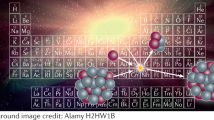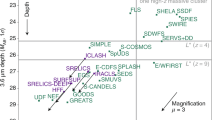Abstract
I PROPOSE to give some answer to the two questions raised by Sir James Jeans, which so clearly summarise the present state of the problem of the evolution of the universe. I will begin with the second question, because I think that its solution may throw some light on the first one: “Is the universe expanding at about the rate indicated by the spectra of the nebulæ”, the atomic constants not being modified by some artificial change of gauge? I add these words, because it is clear that any artificial expansion could be provided by arbitrarily varying the units of length, time, and mass. Expansion of the universe is in some sense relative: it is relative to the whole set of essential properties of matter being assumed to be constant.
This is a preview of subscription content, access via your institution
Access options
Subscribe to this journal
Receive 51 print issues and online access
$199.00 per year
only $3.90 per issue
Buy this article
- Purchase on Springer Link
- Instant access to full article PDF
Prices may be subject to local taxes which are calculated during checkout
Similar content being viewed by others
Author information
Authors and Affiliations
Rights and permissions
About this article
Cite this article
LEMAÎTRE, A. Contributions to a British Association Discussion on the Evolution of the Universe. Nature 128, 704–706 (1931). https://doi.org/10.1038/128704a0
Issue Date:
DOI: https://doi.org/10.1038/128704a0
This article is cited by
-
Simulation model for complexity in black holes and demonstration of power of one clean qubit using IBM QX
Quantum Studies: Mathematics and Foundations (2021)
-
Stable Big Bang formation in near-FLRW solutions to the Einstein-scalar field and Einstein-stiff fluid systems
Selecta Mathematica (2018)
-
Editorial note to: Georges Lemaître, The beginning of the world from the point of view of quantum theory
General Relativity and Gravitation (2011)
Comments
By submitting a comment you agree to abide by our Terms and Community Guidelines. If you find something abusive or that does not comply with our terms or guidelines please flag it as inappropriate.



